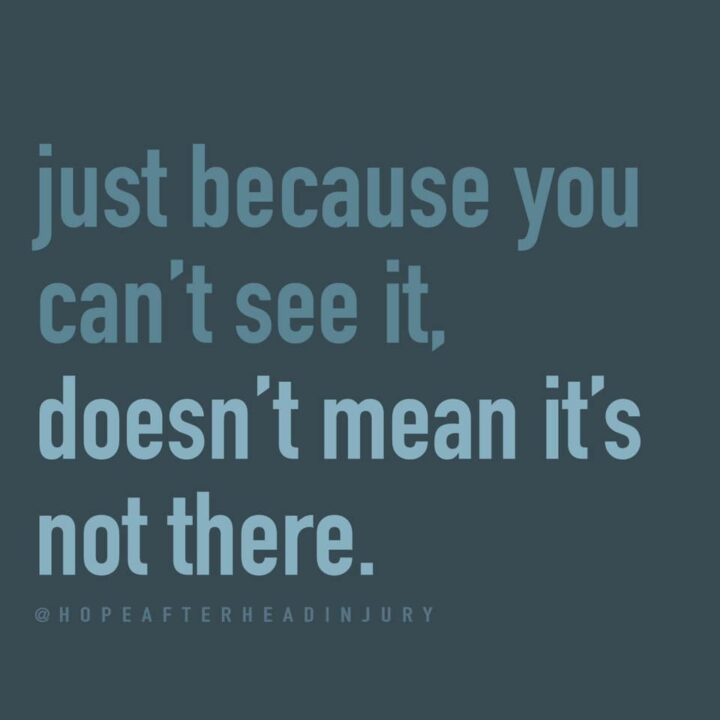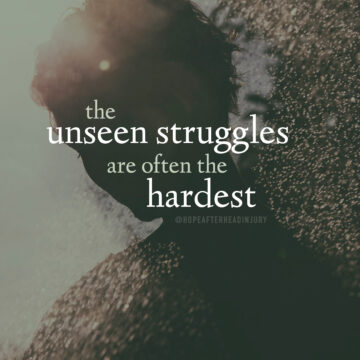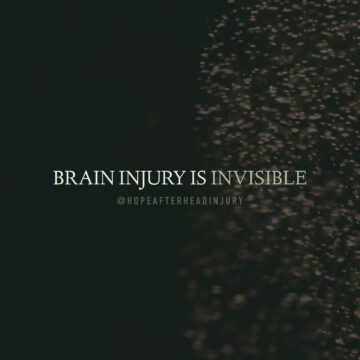You can't always see it on the outside... but the unseen struggles are often the hardest ones for those living with brain injury.
If someone you love is living with a brain injury, concussion, stroke, or anything that affects the function of their brain, it's important to know that it is an invisible injury.
What You Don't See
When you see a brain injury survivor, keep in mind what you DON'T see. At first glance, you don't see a headache. You don't see the feeling of overstimulation or extreme fatigue. You don't see memory loss, confusion, or vertigo. You don’t see emotional struggles, depression or anxiety. You don't see the days of recovery.
When you see a brain injury survivor out and appearing “well”... you don’t see what happens when they get home. You don’t see the crashes or the break downs. You don’t see what that one trip to the store, event, church, etc... you don’t see what that trip cost them.

It's Isolating
Because brain injuries are invisible, it can become a very isolating and lonely experience for the person going through it. Survivors commonly express that they feel misunderstood by those around them. Sometimes they even pretend they are okay when they are not just because they know people will not understand.
Just because you can't see it, doesn't mean it's not there.
Don't Assume
If you have a conversation with a survivor on a good day, don’t assume that every day is like that. Many of us are blessed with some good days. But we have equal as many challenging days if not more. Every moment can be a challenge for survivors.
Never assume anything... just because YOU can't see it, doesn't mean it isn't there. Be informed!
You Can't See a Brain Injury
If you know someone with a brain injury, do not just follow what you see on the outside. You can't see a brain injury because many of the symptoms are invisible too. For example, looking at someone you cannot tell if they have a headache. You can't see the fight the person has to go through just to get through the day.

They Might Not Be Able to Tell You
They might not always be able to express how they are feeling. Some survivors might not be able to tell you what they are feeling. The more you can learn about brain injury, the better you will be able to understand.
Learn to Ask
If your loved one is living with a brain injury, instead of assuming you know how they are doing, ask them. Listen. Engage. Learn. Check in with them. They might not always respond right away due to symptoms, but knowing that someone cares will help them to feel less alone.




Matthew Leborgne
This is the best article. I just wish people without a brain injury would read it
Kathleen Liscio
Totally agree Matthew but it's not just people without TBI, Drs and insurance companies NEED to read and understand articles like this and join in on support group discussions. I am a 5x TBI Survivor who is still deep in my struggle of my 5th TBI which caused me to loose everything. I am finally after 3 yrs with the right Drs but Disability Insurance says I am "just depressed" I did not throw away my 20yr, 6figure career, my 7 yr relationship with my fiance, most of friends and my perfect life because out of the blue and coincidentally immediately after my accident I woke up "sad". It is beyond absurd that they have total disregard for all the Medical Diagnosis that these multiple TBI have caused and can just focus on the 1 thing that gets them off the hook and the right to treat me like I am crazy!
How do we educate them???
Donna
This is amazing and so so helpful. Thank you